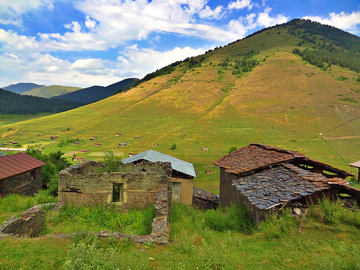The Three Alazani Rivers Biosphere Reserve in Georgia
April 05, 2023.
This research aims to understand the complex human- environmental interactions in the designated UNESCO Three Alazani Rivers Biosphere Reserve in Georgia, Caucasus. The project is part of the Right Livelihood College (RLC) Campus Bonn at ZEF and is working in Georgia together with the Succow Foundation of Michael Succow, who received the Right Livelihood Award in 1997. The project is funded by the German Academic Exchange Service (DAAD).
Regional history of nature conservation
Situated at the crossroads of Europe and Asia, Georgia (Sakartvelo in Georgian) is part of the wider Caucasus ecoregion and one of the biodiversity hotspots worldwide. Different nature conservation measures and schemes, like National Parks, Strict Nature Reserves, Habitat and Species Management Areas, Protected Landscapes have been implemented in Georgia since Soviet times and even before. Many of these initiatives have not fulfilled their aims of conserving ecosystems and biodiversity nor included the needs of the local population. Upon this backdrop, the Three Alazani Rivers Biosphere Reserve was nominated to UNESCO in 2021 and designated in 2022, and is now the first UNESCO Biosphere Reserve in the South Caucasus (covering Armenia, Azerbaijan, Georgia).
Why Biosphere Reserves?
Biosphere Reserves aim to harmonize human-nature interactions and promote sustainable development for people living in and around these Reserves, while maintaining natural ecosystems and biodiversity. All Biosphere Reserves are structured into different zones: Namely core, buffer and transition areas. While it is quite challenging to achieve all the aims, several factors are key in determining the effectiveness and success of Biosphere Reserves: Stakeholder involvement, governance approaches, proper zonation and management plans, in addition to clear and coherent monitoring and assessment. The designated Biosphere Reserve in Georgia covers a rich, diverse and distinct natural and cultural heritage, like the high mountains of Tusheti at the Russian border, shaped by nomadic sheep farming as well as lowland areas like the Pankisi Gorge inhabited by Kist people who are of Chechen descent.
Research plans and set-up
The research project incorporates different qualitative and quantitative data-gathering methods including interviews with people from different target groups, participant observations, transect walks, participatory mapping, and focus group discussions. In 2022, first explorative field research was conducted. The results will help to show the perceptions of different groups of people living in and around the Three Alazani Rivers Biosphere Reserve concerning the Reserve, their needs, as well as the potential benefits and risks for their livelihoods.
Apart from filling the existent knowledge gaps concerning the human-environmental interactions in the research region, the project outcomes have the ambition to improve governance and management practices for other Protected Areas in Georgia, the Caucasus region, and beyond.
Author: Ketevan Ugrekhelidze is a junior researcher with ZEF and the Right Livelihood College Campus Bonn.
Contact: s22kugre(at)uni-bonn.de
This article was published in ZEF News No. 46.


